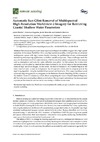Identificador persistente para citar o vincular este elemento:
https://accedacris.ulpgc.es/jspui/handle/10553/48655
| Título: | Automatic sun glint removal of multispectral high-resolution WorldView-2 imagery for retrieving coastal shallow water parameters | Autores/as: | Martin, Javier Eugenio, Francisco Marcello, Javier Medina, Anabella |
Clasificación UNESCO: | 2209 Óptica | Palabras clave: | High resolution Worldview-2 Atmospheric 6S model Sun glint Shallow water, et al. |
Fecha de publicación: | 2016 | Publicación seriada: | Remote Sensing | Resumen: | Remote sensing of coastal areas requires multispectral satellite images with a high spatial resolution. In this sense, WorldView-2 is a very high resolution satellite, which provides an advanced multispectral sensor with eight narrow bands, allowing the proliferation of new environmental monitoring and mapping applications in shallow coastal ecosystems. These challenges need the accurate determination of the water radiance, which is not often valued compared to other sources such as atmosphere and specular water reflection (sun glint). In this context, the atmospheric correction and the glinting removal have demonstrated to be critical steps in the preprocessing chain of high resolution images. In this work, the Second Simulation of a Satellite Signal in the Solar Spectrum (6S) is used to compensate the atmospheric effects and to compute part of the deglinting algorithm using the modeled direct normalized irradiance. This paper describes a novel automatic deglinting procedure, integrated in the Radiative Transfer Modeling (RTM) inversion of the shallow water environments, which allows computing the water Inherent Optical Properties (IOPs), bathymetry and seafloor albedo contributions. The proposed methodology has demonstrated a proper performance for environmental monitoring in shallow water areas. | URI: | https://accedacris.ulpgc.es/handle/10553/48655 | ISSN: | 2072-4292 | DOI: | 10.3390/rs8010037 | Fuente: | Remote Sensing [ISSN 2072-4292], v. 8 (1), 37 |
| Colección: | Artículos |
Citas SCOPUSTM
57
actualizado el 08-jun-2025
Citas de WEB OF SCIENCETM
Citations
55
actualizado el 22-feb-2026
Visitas
98
actualizado el 13-jul-2024
Descargas
92
actualizado el 13-jul-2024
Google ScholarTM
Verifica
Altmetric
Comparte
Exporta metadatos
Los elementos en ULPGC accedaCRIS están protegidos por derechos de autor con todos los derechos reservados, a menos que se indique lo contrario.
